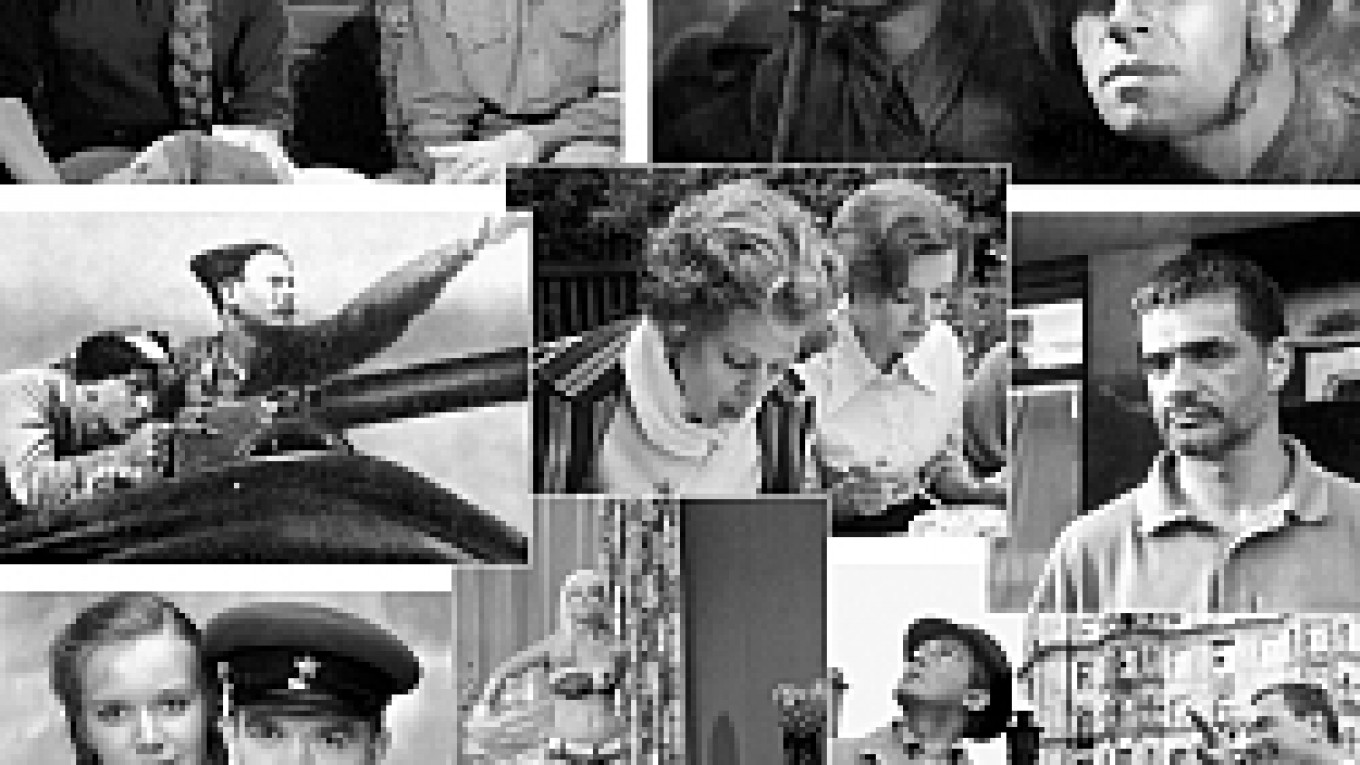It has long been debated whether tragic plots indeed better coincide with the Russian mentality and cultural background, or whether that was just a stereotype successfully spread by greedy producers and distributors of the silent-film era, eager to cash in on anything. Some cultural theorists have explained the prevalence of tragic endings in early Russian films by stating that the entire Russian artistic tradition of the 20th century -- including cinema -- derived from ancient and, therefore, "sublime" art forms, as opposed to Hollywood-style mass-culture products. Of course, this statement looks a little far-fetched from today's perspective.
The practice of changing the finales of Hollywood films in order to bring them in line with the assumed tastes of Russian audiences started before the Bolshevik Revolution. At the time, domestic producers claimed that Russian audiences, brought up with 19th-century theatrical melodramas -- which inevitably ended sadly -- would not like films with happy ends, instead preferring death, blood and suicide.
As a result, changes were made to the films' original plots. When the well-known Russian director Yakov Protazanov remade D.W. Griffith's "The Lonely Villa" as "Drama on the Telephone" in 1914, he gave it a totally different denouement. In the original version, the father is able to get back home in time to rescue his family, but in Protazanov's film, he arrives too late and finds his wife killed by the burglars.
At the time, the Russian film industry was already working for the foreign market as well as for the domestic one, and the export version of Protazanov's "By Her Mother's Hand" ended happily, with Lidochka, the heroine, recovering from her illness. Domestic moviegoers, meanwhile, were presented with the sight of her lying in a coffin.
Ironically, it was only eight decades later that a Russian-made film featured two different endings for the domestic and foreign markets. In 1997, the U.S. distributors of Pavel Chukhrai's "The Thief," which was nominated for the Best Foreign Language Film Oscar the following year, made the director cut out its epilogue set in Chechnya.
The 1917 Revolution signified a substantial change in the aesthetic and ideological priorities of domestic cinema. This became especially noticeable by the early 1930s. As Stalin's regime matured and the state assumed tighter control of all the arts, the cinema became a powerful propaganda tool. At this point, the tradition of tragic endings was perceived as something bourgeois, decadent and hardly consistent with the new type of hero, the "builder of communism."
 CTB In Russia, films can enjoy box-office success despite grim endings. The 2003 hit "Boomer," below, ends badly for its gangster heroes. | |
During this time of unbridled on-screen optimism, the only outlets for tragic endings were biopics, such as the Vasilyev brothers' 1934 "Chapayev," a tale of the life and death of Vasily Chapayev, a legendary Red Army commander in the Russian Civil War (and later the butt of numerous jokes).
In 1941, Hitler's attack on the Soviet Union again changed the priorities of Soviet cinema, which began to focus on the heroism of Soviet citizens fighting Nazi Germany. Here, both tragic and happy endings were common, with the main protagonist either facing a heroic death on the battlefield or joyously surviving. In Leonid Lukov's "Two Soldiers" from 1943, both of the main characters stay alive, while in Alexander Zarkhi's "The Last Hill" from 1944, the characters die.
World War II remained one of the prevalent themes in Soviet cinema for several decades after Germany's defeat. Alexander Stolper's 1948 "Story of a Real Man," based on Boris Polevoy's novel of the same name, tells the true story of pilot Alexei Maresyev who, thanks to his courage and perseverance, survived against all odds after his plane was shot down by the Germans. In Grigory Chukhrai's "Ballad of a Soldier" from 1959, which was nominated for an Oscar in 1962, the main character, the 19-year-old soldier Alyosha, takes a few days of leave as a reward for a heroic act at the front, after which he returns to the front lines. At the end, a voiceover announces that Alyosha never did come back from the war.
As the war retreated further and further into the past, the preferences of domestic audiences shifted once again toward light-hearted comedies with happy endings. In the 1960s and '70s, Soviet moviegoers' favorites were primarily comedies by Eldar Ryazanov and Leonid Gaidai, which almost always ended well for the main characters.
In Ryazanov's "Beware of the Car" from 1966, a Soviet Robin Hood who steals cars from corrupted individuals, then sells them and sends the proceeds to orphanages, gets a light prison sentence and is released to meet his fiance in the finale. In Gaidai's "Diamond Arm" from 1968, Semyon Gorbunkov, a naive and law-abiding Soviet citizen, is accidentally caught up in an unlawful smuggling scheme but manages to defeat the criminals and turn them over to the police in the end.
At the very end of the 1970s, several Soviet filmmakers made noteworthy attempts to adopt the Hollywood style. In accordance with the Hollywood model, Alexander Mitta's disaster movie "Air Crew," Boris Durov's action thriller "20th-Century Pirates" and Vladimir Menshov's melodrama "Moscow Does Not Believe in Tears" all featured a happy finale. Notably, Menshov's take on the Cinderella story, set in the Soviet Union of the 1950s and 1970s, was equally successful at home and abroad, winning an Oscar for Best Foreign Language Film.
With the loosening of censorship as a result of glasnost in the late 1980s, topics that used to be taboo under the previous system began to be actively explored by filmmakers. A wave of chernukha, or dark naturalism, inundated Russian cinema and swept away almost everything else. There was no longer a place for happy endings. The teenage heroine of Vasily Pichul's "Little Vera" attempts suicide; in Pyotr Todorovsky's "Intergirl," a reformed prostitute dies in a car crash; and in Sergei Solovyov's "Assa," the protagonist Bananan is killed by a mafia boss who, in turn, gets shot by his mistress.
Since then, despite drastic political and cultural changes in the country, Russian filmmakers' inclination for sad endings seems to have remained unchanged. The last major international success story in Russian film, Andrei Zvyagintsev's 2003 "The Return," which won a Golden Lion at that year's Venice Film Festival, has a tragic denouement in which an unnecessarily strict father dies in an attempt to save his younger son. In Pyotr Buslov's criminal drama "Boomer," which enjoyed overwhelming popular success a couple years ago, two of the four main gangster characters are killed, one gets caught by the police and only one manages to escape -- thanks to his betrayal of the rest of the bunch. And in the finale of last year's box office winner "Company 9," all but one of the unit's soldiers die.
Vladimir Kozlov is a journalist, fiction author and film student at the PCFE Film School in Prague.
A Message from The Moscow Times:
Dear readers,
We are facing unprecedented challenges. Russia's Prosecutor General's Office has designated The Moscow Times as an "undesirable" organization, criminalizing our work and putting our staff at risk of prosecution. This follows our earlier unjust labeling as a "foreign agent."
These actions are direct attempts to silence independent journalism in Russia. The authorities claim our work "discredits the decisions of the Russian leadership." We see things differently: we strive to provide accurate, unbiased reporting on Russia.
We, the journalists of The Moscow Times, refuse to be silenced. But to continue our work, we need your help.
Your support, no matter how small, makes a world of difference. If you can, please support us monthly starting from just $2. It's quick to set up, and every contribution makes a significant impact.
By supporting The Moscow Times, you're defending open, independent journalism in the face of repression. Thank you for standing with us.
Remind me later.


